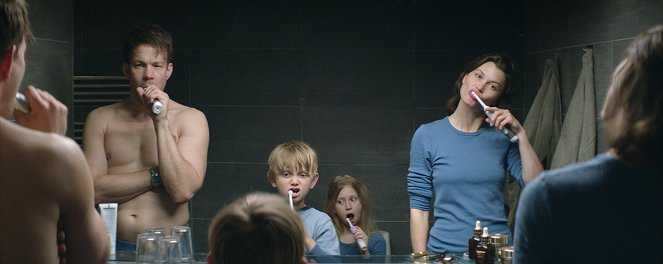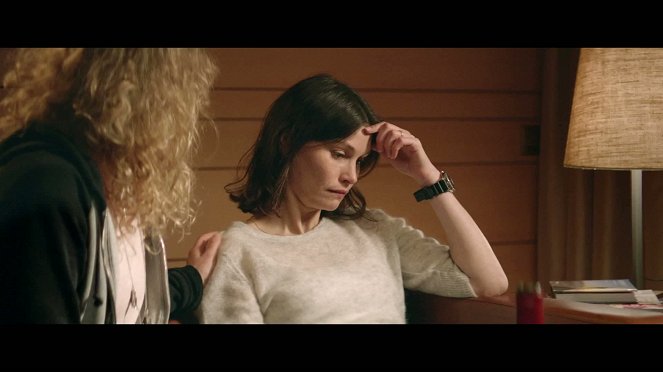Regie:
Ruben ÖstlundDrehbuch:
Ruben ÖstlundKamera:
Fredrik WenzelMusik:
Ola FløttumBesetzung:
Johannes Bah Kuhnke, Lisa Loven Kongsli, Clara Wettergren, Vincent Wettergren, Kristofer Hivju, Fanni Metelius, Karin Myrenberg Faber, Brady Corbet (mehr)Streaming (3)
Inhalte(1)
Eine junge schwedische Familie macht Skiurlaub in den französischen Alpen. Die Sonne scheint, die Pisten sind herrlich, das Berg-Idyll perfekt. Doch plötzlich geschieht beim Mittagessen auf der Restaurant-Terrasse die Katastrophe: Eine Lawine rast mit voller Wucht auf sie zu. Panisch ergreift Mutter Ebba die beiden Kinder – panisch ergreift Vater Tomas... die Flucht. Als sich der Nebel legt sind alle unversehrt. Das große Unglück ist zwar ausgeblieben, doch zurück bleibt der Schock über Tomas Handeln. Die Kinder streiken, die Ehe kriselt und Tomas muss schwer mit seiner mangelnden Courage und seiner angeschlagenen Männlichkeit kämpfen. (Alamode Film)
(mehr)Videos (8)
Kritiken (9)
In kritischen Momenten reagieren Menschen nach drei grundlegenden Mustern und teilen sich daher in drei grundlegende Gruppen ein. Die Reaktion kann nicht erlernt werden, daher kann niemandem vorgeworfen werden, dass er zur Gruppe A oder Gruppe C gehört und so oder so reagiert. Es hängt von vielen Umständen ab. Leider eskaliert im Film alles wegen der Anwesenheit der Kinder in einer kritischen Situation und dann bekommt der Mensch aus Gruppe C von seiner Frau Vorwürfe, dass er alles vermasselt hat. Ein weiteres Paar wird in die Geschichte verwickelt und wir haben einen weiteren großartigen Film des schwedischen Filmmagiers. Ein anregendes Werk.
()
Paradies: Schnee. Es geht hier um eine intensive Beziehungslawine, die um die Gipfel von Bergman, Trier, Seidl und Andersson umherschweift und (was für Östlund typisch ist) mit einer großen und scheinbar überflüssigen These endet, die selbst in Filmform die Rolle der Heuchelei und Falschheit beim Konstruieren der Realität präsent werden lässt. Während ich die ersten 2/3 des Films für absolut brillant im Bezug darauf erachte, wenn es darum geht, Details zu beobachten und mit Gesinnungswechseln zu arbeiten, klingt die Schlussfolgerung wie im Falle von Play - Nur ein Spiel wie ein intellektuelles Konstrukt ohne Debatten eines äußerst klugen Machers aus. Es sind hier gleich mehrere Stellen, an denen Rubens den Film den Film hätte als erschreckendes Bild des intimen Verfalls sowie der Unsicherheit stoppen können, jedoch er zieht es vor, sich der pragmatischen Metapher des Kollektivs zuzuwenden. Höhere Gewalt ist eine Art von Film, welche es vermag das Vertrauen in Liebesbeziehungen zu erschüttern und die Zerbrechlichkeit sowie und den Grad der Manipulation exakt zu erfassen, mit denen wir sie am Laufen halten. Hiermit wird auch die dünne Kruste exakt benannt, unter welcher die distanzierte nordische Gesellschaft ihre Instinkte verschlossen hat, welche sich dann mit überraschender Intensität zu Wort melden, und zwar in einer Umgebung voller bizarrer menschlicher Rituale (in dieser Hinsicht erinnert die Höhere Gewalt an Seidls Trilogie-Paradies). Eine Bestätigung dafür, dass Östlund die erste Liga der Art-Filme spielt. Vielleicht müsste er es schlichtweg nicht immer so heraushängen lassen. [80%]
()
When a man falls out of his role... As with an avalanche, even an imperceptible stimulus is enough to trigger a relationship crisis. One selfish act of self-preservation leads to further transgressions and misconduct. Instead of falsely cheerful vacation pictures (the film begins with the staging of one such photograph), we watch the chronicle of a breakup. The demoralising atmosphere of mutual mistrust also sucks in the loved ones of the conflicting parties. This avalanche may not kill anyone, but it won’t make them stronger either. The mountain scenery provides a benchmark for assessing the severity of the problems that the characters face. The setting, the unsettling musical motif and many of the situations depicted (disappearing into the fog, the incompetent bus driver) promise great tragedy, which is the perspective that corresponds to how the head of the family wants to see his failure. What actually unfolds on the screen, however, is an intimate family drama. The voyeuristic, predominantly static camera, which as a matter of principle does not assume the point of view of the characters, does not explicitly lead us to a clear interpretation, but the shot compositions make it clear that the weak link here is not the woman who is being pushed out of the picture, but rather the man who doubts his own masculinity to such an extent that he has to ostentatiously convince himself (through a drinking session with the parameters of a pre-civilisation male ritual) and those around him of it: the attempt at intimacy with his wife, reflected in a mirror, has the same vague contours as Tomas’s status as head of the family. The devastation is accelerated by the fact that both partners desperately lack a sense of detachment, unlike the director, who enjoys demolishing the tense atmosphere of Bergman-esque psychological drama with incursions from worlds that are different in terms of genre (the attack of a child’s drone, the sticker on the door). Thanks to the unwillingness to compromise or to in any way make the characters’ situation easier for them, Force Majeure is an invaluable training video for similarly “calamitous” situations in your own relationship. 80%
()
The Scandinavian festival in Mladá Boleslav prepared a real gem for me for one Wednesday evening. The director Ruben Östlund has already convinced me once with the film Play that he can be original and the Force Majeure seemed at least as interesting. The result exceeded all expectations. This is an absolutely precise decomposition of the man/woman relationship and parents/children relationships in one not entirely pleasant situation. It made me sick for a while, but the director softened everything with a lot of good and funny scenes. The actors were also good, and if only the final scene of the dad having a psychotic episode had been a little better, I would’ve been absolutely satisfied. Seen based on the Challenge Tour 2015.
()
An interesting relationship drama filmed as a psychological drama of a family taken out of the routine of domestic life and exposed to a test of trust. Its sense of atmosphere created by the editing and selection of musical motifs cannot be denied, as well as the decent acting of unfamiliar actors from the North and, after all, the ability to sometimes strike a nerve. However, I will ultimately not give the film a fourth star because Östlund sometimes gets lost in intellectual theses instead of characterizing the problems of partnership life objectively. Some viewers, including myself, will somewhat wonder about what the author wanted to convey, for example, through the pedestrian descent of hotel guests through mountain switchbacks toward civilization. If the entire conflict is built on a story with an avalanche, then the director misses out on much of human psychology and what constitutes the foundation of partnership relationships. Similar incidents belong to the category of those that can annoy, but just like the fallen avalanche of snow, emotions will soon subside and a sober-minded person will only laugh at them. A much greater danger to partnership cohesion is a hysterical outburst of self-pity, pettiness, and self-contempt, as demonstrated by the film's protagonist facing his wife. They belong to those that can forever change one's perspective on a partner and easily destroy the prospect of continued coexistence. By the way, from the perspective of dramatic structure, it would have been much better for the film to let the viewer balance their sympathies for the actors of the story and keep them undecided as to whose side to ultimately lean toward. Until the mentioned scene, the film prompted thinking, but after that, it was only about taking positions. If I were willing to view the avalanche story as a catalyst for long-simmering dissatisfaction, when a hundred nothings can exhaust and one spark can unexpectedly ignite a barrel of gunpowder, the reactions and actions of all family members would make much more sense. However, Östlund never gave me any indications for that and probably meant it exactly as he filmed it. Overall impression: 60%.
()
Galerie (18)
Photo © Magnolia Pictures



Werbung